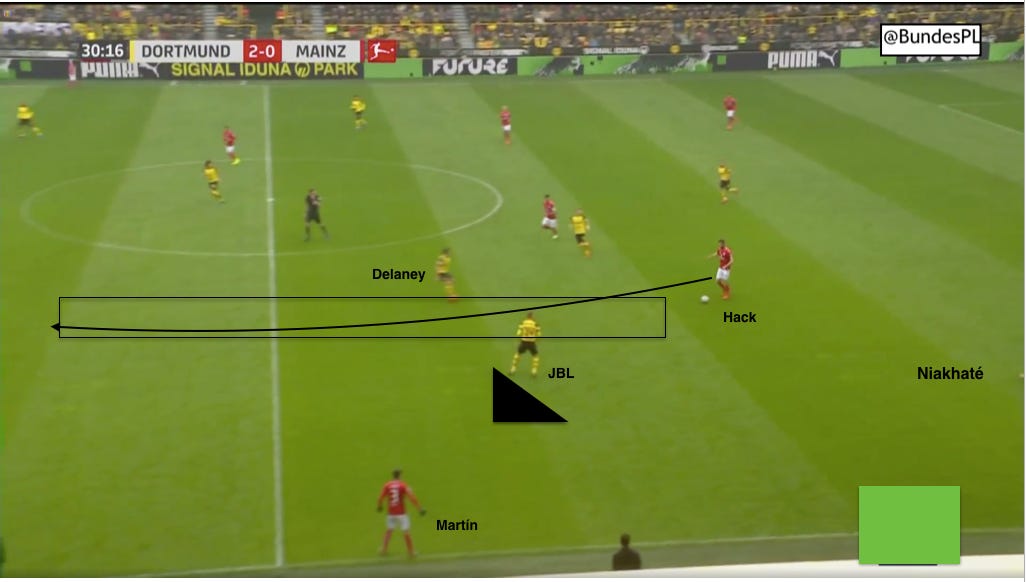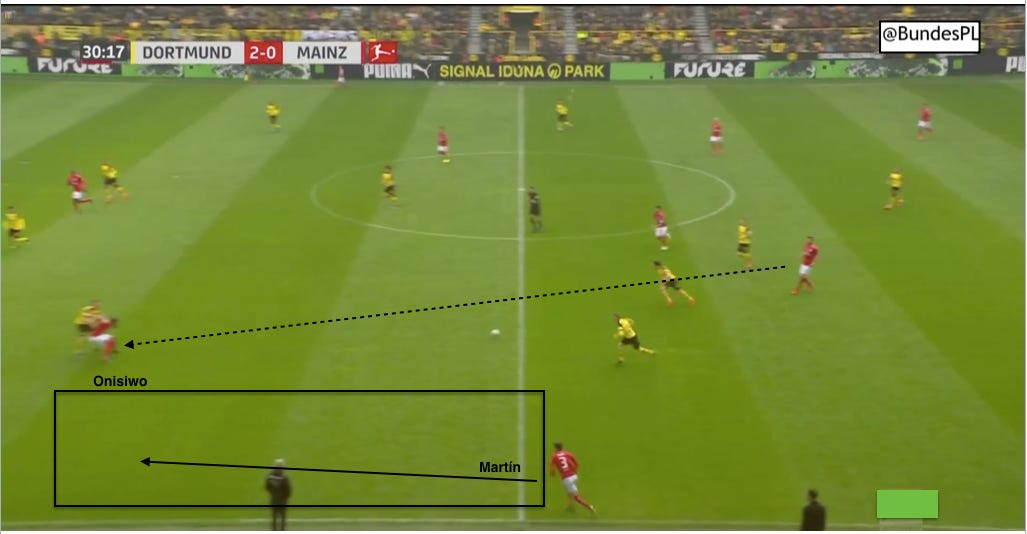BVB-Mainz: anatomy of a thriller
How Roman Bürki saved BVB as Sandro Schwarz nearly took three points from Dortmund
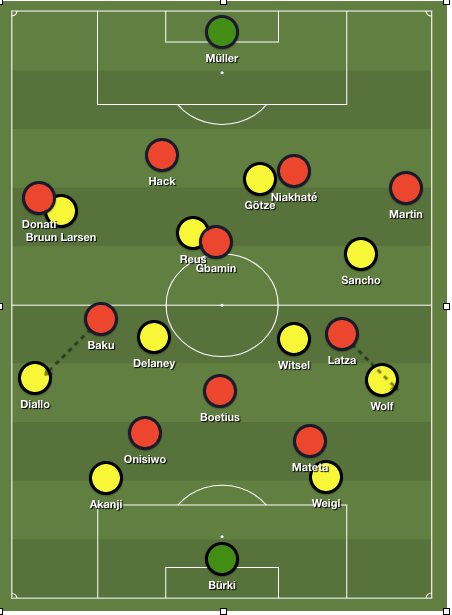
Dortmund dominate first half then hang on for dear life vs Mainz
In Saturday’s initially comfortably looking but ultimately nail-biting 2-1 win, Dortmund played one largely excellent half against Mainz and led 2-0. Although given the tough second half and the absolutely brutal last 20 minutes, there are some concerns if the BVB dominance was not just down to FSV’s tepid start. With Jadon Sancho bagging two goals and two crucial misses by Jacob Bruun Larsen, Dortmund’s two goal halftime lead was more than deserved. A 9-2 shots edge, 70% possession and 1.55 XG vs 0.4 conceded all signaled a dominant performance, even if Karim Onisiwo’s 43rd minute back heel grazed the post!
2-0 up at home vs a 12th placed Mainz team that didn’t have a whole lot to play for, all BVB needed to do is to close out the match in the second half. Instead, Mainz proceeded to put up 15 shots and 8 on target and over 2 XG, and barring a miraculous triple save from Roman Bürki, should have grabbed at least one point.
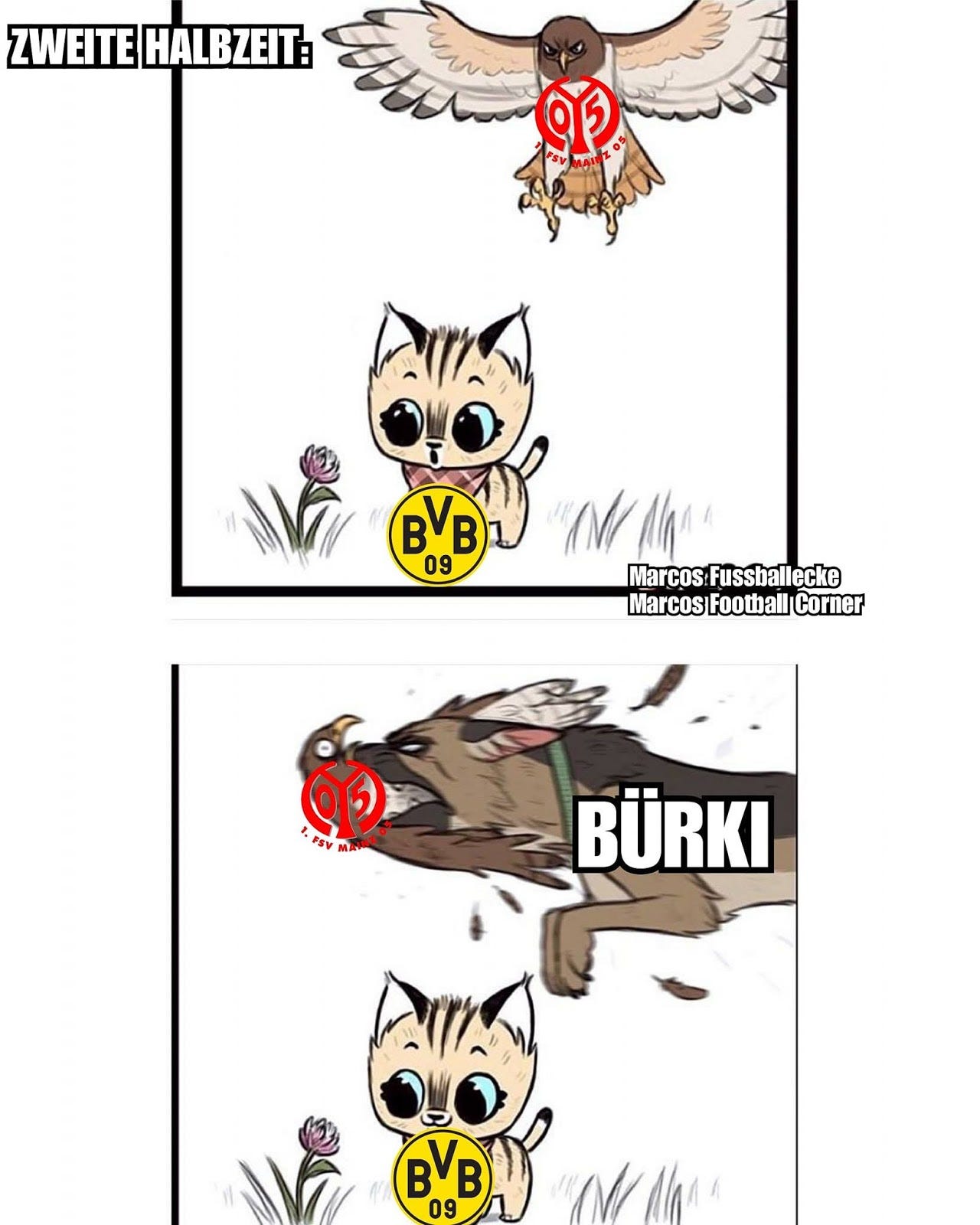
Both Lucien Favre (“when Mainz changed its system we just could not defend”) and Marco Reus concurred with this assessment:
https://twitter.com/dw_sports/status/1117136078551572480
Before we get to the inevitable bad, let’s look at what went right for BVB in the opening 45 minutes:
First half - the downside of a passive 5-man deep block, space on the wings, BVB’s excellent tempo in transition via Götze
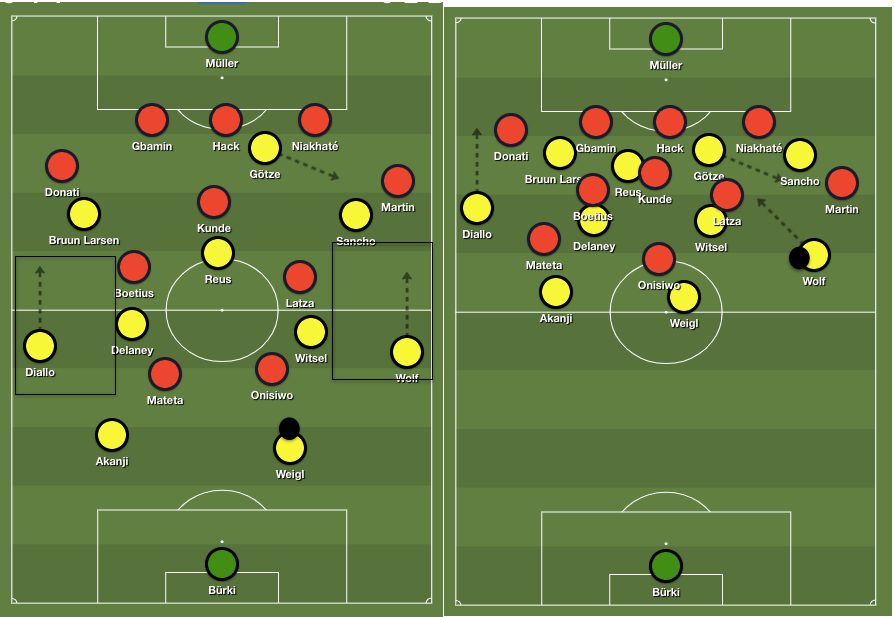
Given the struggles of BVB against five man backlines and the successes of somewhat passive, deep block teams like Augsburg, Nürnberg or even Stuttgart (tied until the 83rd minute) this spring, Mainz and Sandro Schwarz were understandably trying to copy that match plan. Unfortunately, setting up in a deep block 5-3-2 with the 8s focusing inward on Witsel\Delaney, Mainz were constantly exposed on the flanks: Diallo and Wolf were given tons of space by the formation (that’s one of the natural disadvantages of a deep 5-3-2) and the ex-FSV player took full advantage. The reasons for why Wolf - 6 of 8 on attacking third passes and 31 completed passes in the first half to the 58 of Diallo - couldn’t/didn’t exploit that space have to do more with his limitations with the ball, and the resulting more aggressive pressing by Martín.
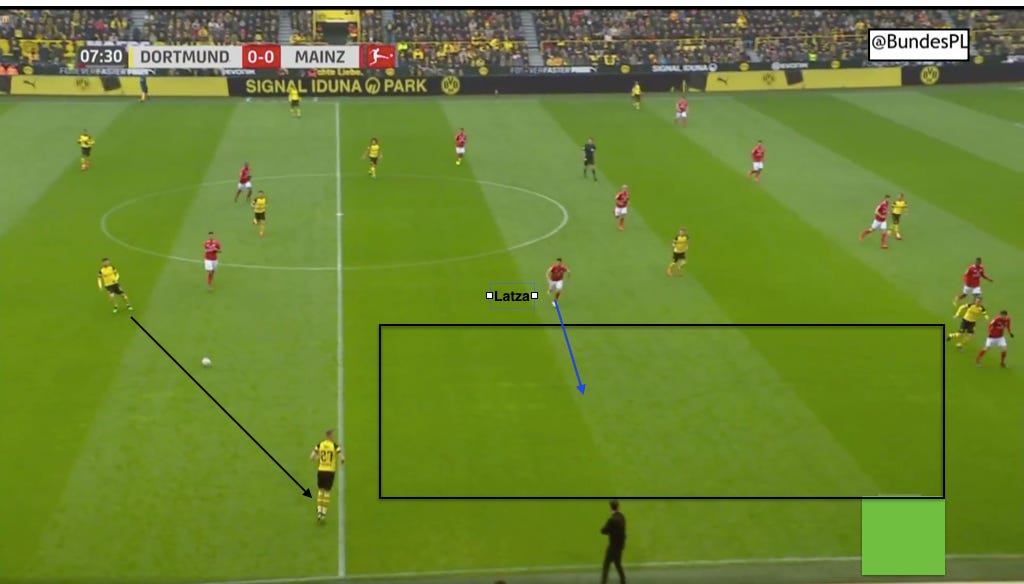
Due to a combination of a slow pass/slow decision-making by Wolf, he would not exploit this space on this play. Let’s look at the left side for a stark contrast! On a rare high press, Diallo is given the ball.
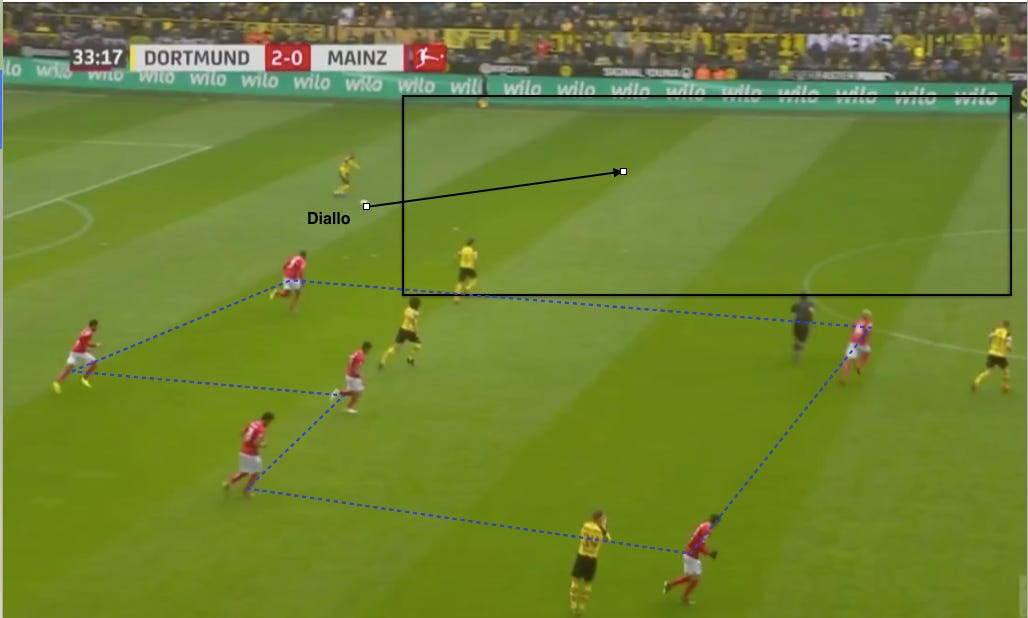
Six seconds later, Diallo is in the attacking third:
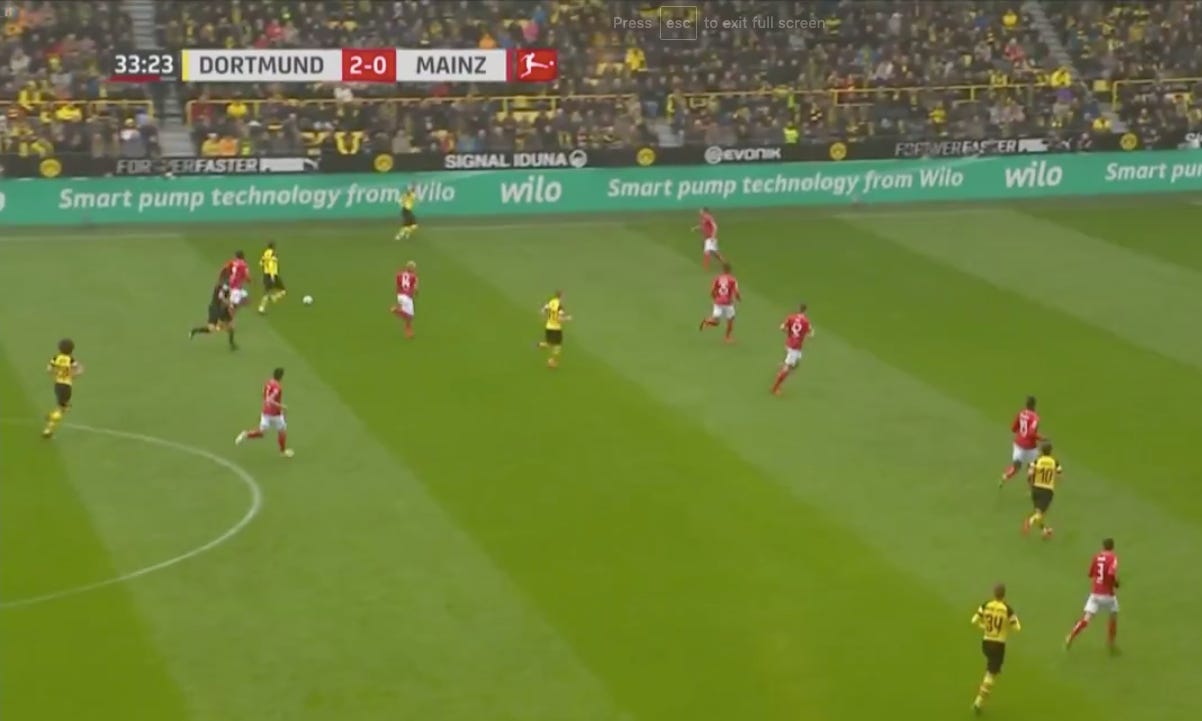
Even during regular play, the combinations on BVB’s left side caused headaches for Mainz.
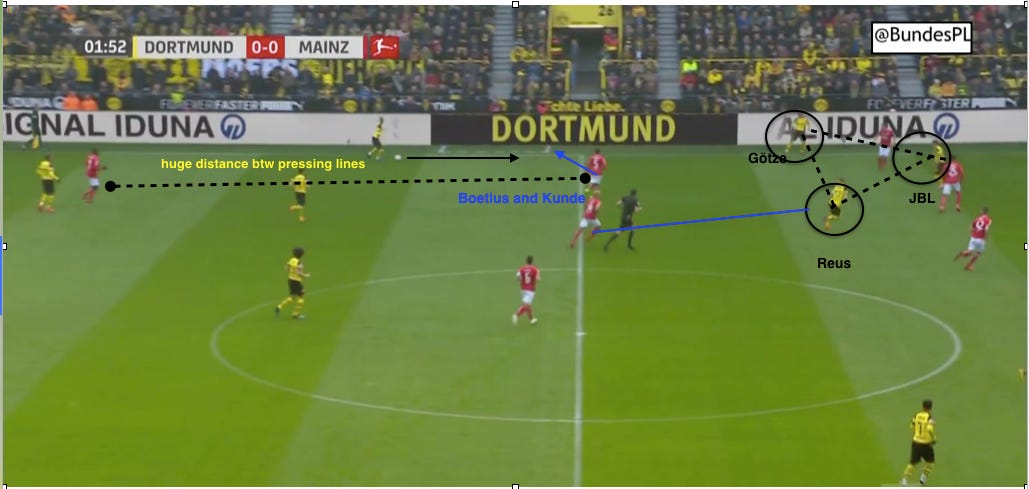
Here is a nice example of Sandro Schwarz’s difficulties: the two attackers, Mateta and Onisiwo (he just pressed Weigl and forced the switch) are disconnected from the second pressing line of Kunde/Boetius/Latza. In addition, BVB overload the left wing with three players (Götze,Reus, Bruun Larsen) and Sancho is lurking on the back post, so the back five has to stay deep. This leaves Boetius to slide out wide to try to close down Diallo. Because Donati was preoccupied with Götze and JBL, the Frenchman could go forward with impunity: he had 17\19 in attacking third passes - a stat that led all players in the first half. The fact that he ended 22 of 25 is a testament to the second half changes by Mainz.
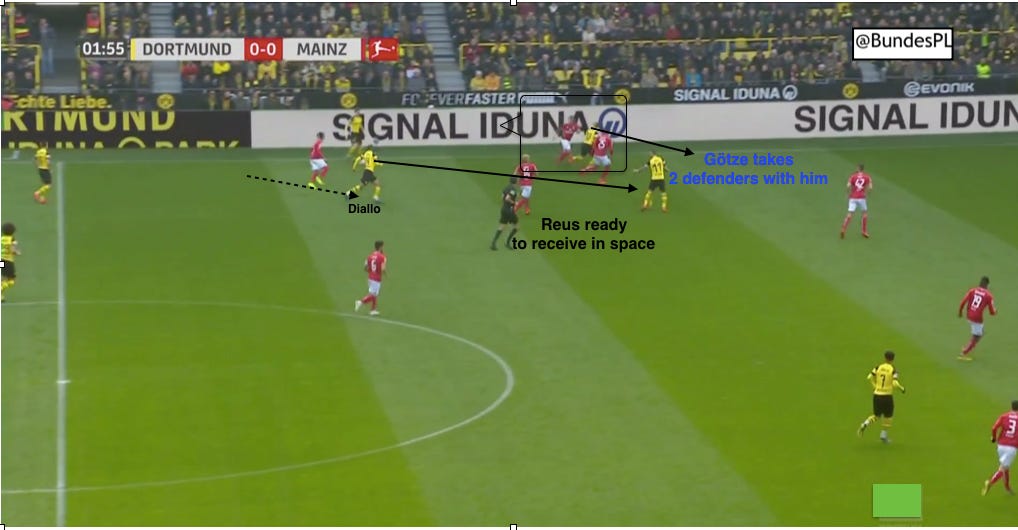
On this occasion Bruun Larsen failed to play the ball on time, but because BVB were able to easily bypass Mainz’s rare and ineffective high press they would often get semi-transition looks.
Apparently Jadon Sancho vs Giulio Donati in space is a GOOD thing!
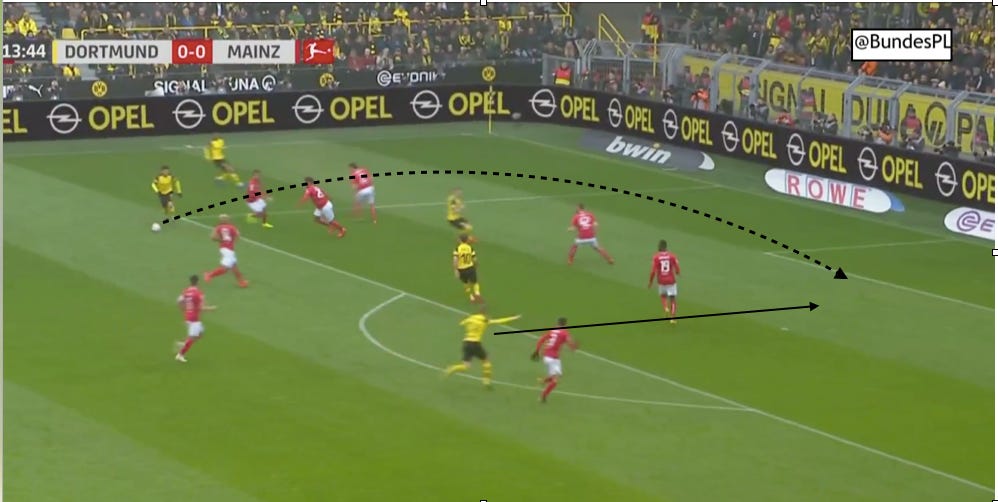
Bruun Larsen would miss this/force a great save from Florian Müller from inside the six, but BVB would take the lead on another quick transition play: Wolf played a long ball that Niakhaté misjudged and a sublime first touch by Götze set the German up for a cross and tap-in for Sancho. In the 24th minute, the 19-year-old would get his second after a good counterpressing move by Delaney and some clever movement by Reus to hold his run and keep Gbamin and his marker Kunde occupied. The focus on Reus and the run of Delaney was rewarded by Götze with a great third man run pass.The assist was his first since his header to Reus against Wolfsburg. While that play might make it into a few coaching drills video, the Niakhaté-Martín back post defending definitely won’t….
With a two goal lead, Dortmund, who had 72% possession, sat back and allowed Mainz to have the ball. The Zerofivers did improve to 36% until the break (and would go up to 45% for the rest of the match) and attempted to build up on the left side in an asymmetric shape, pushing the attacking-minded Martín high in one of two ways:
Pierre Kunde who went 27 of 30 on passes before surprisingly getting hooked at halftime (my guess is Schwarz wasn’t happy with his defensive work on Reus and that turnover that nearly meant the third BVB goal if Bruun Larsen could have finished in the 31st), actually completed 15 of 17 FORWARD passes, while Mainz as a team had just 60 in the first 45 minutes (removing Müller’s long balls). Those passes were mostly for Martín who created one chance in the first half https://twitter.com/BundesPL/status/1117119184050192384
The other ball circulator for FSV was Danny Latza, who after occasionally starting the play deep, was the recipient of 9 Martín passes in the first half.
Rarely, CB Alexander Hack was able to break the lines with a pass up to Onisiwo who had drifted to the left against Marius Wolf:
Onisiwo did not spot Martín and turned inward to switch sides to a high-positioned Giulio Donati, this strategy was not without risks: Donati’s central pass to Kunde resulted in a poor back pass and a counter for BVB (led by Witsel, set up by Götze once again) that Bruun Larsen, after a nice move to shake Niakhaté fired wide…
Towards the end of the first half, the timid away side finally pressed a little higher in a 3-1-3-3 shape:
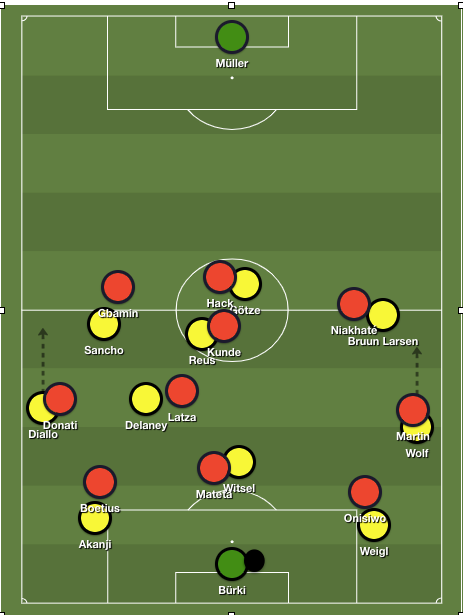
And tried pushing Latza up to Witsel and leaving Boetius on Delaney:
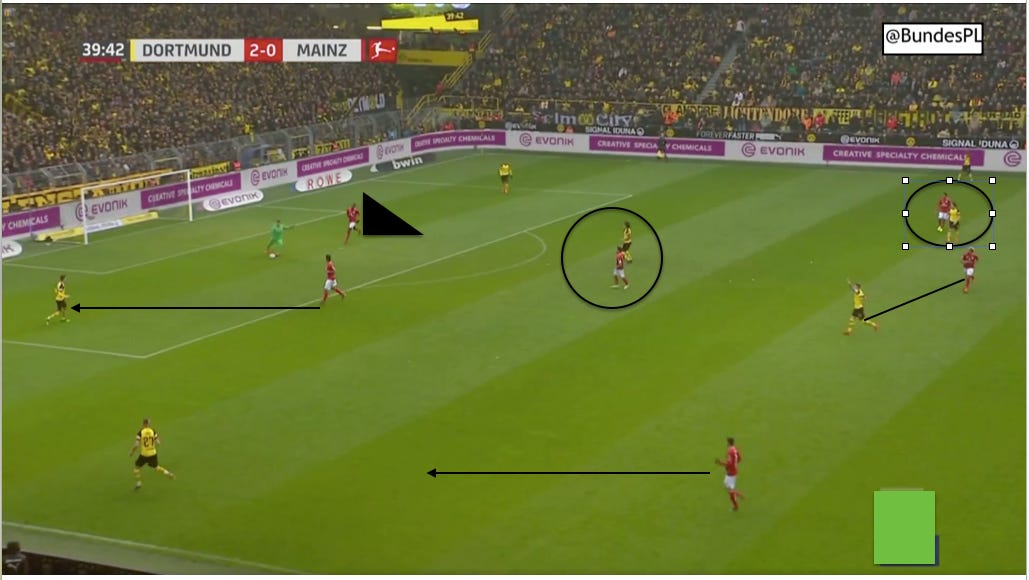
This resulted in some turnovers and some contested aerials, which if you have seen the Bayern game and realize that BVB had Reus\Götze\Sancho up top on Saturday, is certainly not a bad thing. In addition, the pressure could cause Dortmund to slip up as Julian Weigl did after a mishit pass by Martín: the CB who was watched by Manchester City scouts in attendance pulled a mistake (not unlike Zagadou whom he replaced in the Bayern game) that nearly resulted in an audacious Alex Del Piero backheel equalizer by Onisiwo:
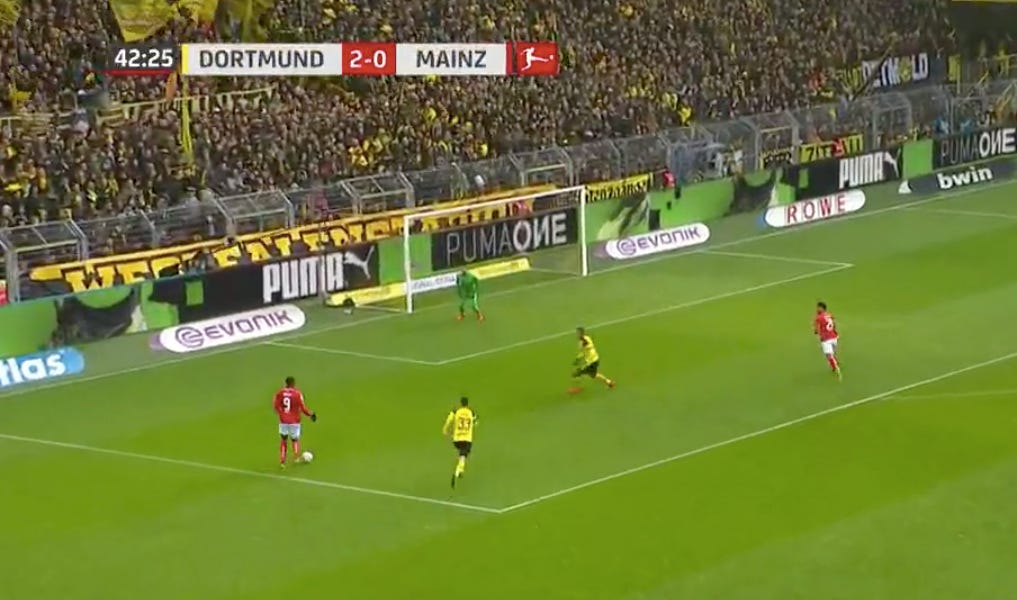
Götze in top form
Another reason, perhaps the biggest, why Dortmund looked very comfortable in the first half, was because Mario Götze had a GREAT game floating between the lines. As Mainz defended Marco Reus with a man-marking concept executed by Pierre Kunde and left all three of their CBs sitting deep, Götze could drop back into the left or right halfspace as he pleased. 11 of 13 attacking third passes completed, three key passes, the assist for Sancho, the “hockey assist” to Delaney meant that he initiated both BVB goals, and could have had another if Bruun Larsen had scored his 1v1 in the 31st.
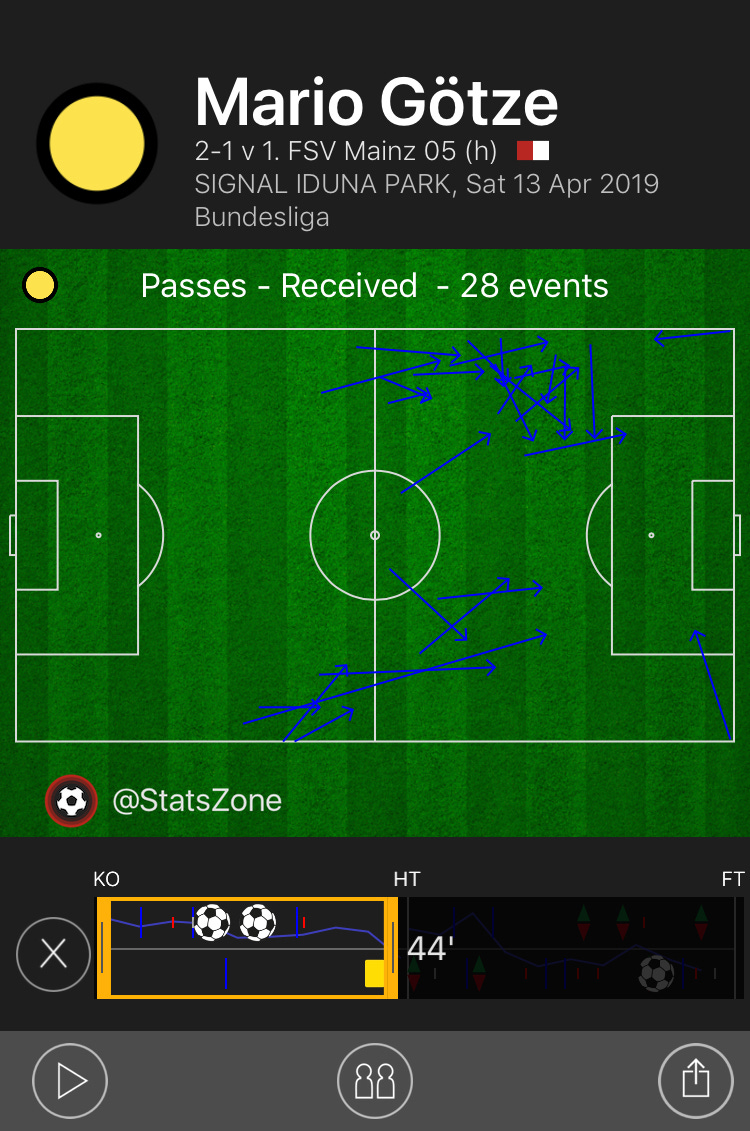
Look at the difference in terms of position, first half vs second half passes received - Götze was forced to play and pass deeper.
Schwarz > Schwarzgelben?
Sandro Schwarz’s adjustments this season have surprised a few teams, and in particular the former Klopp teammate’s 4-4-2 diamond formation (analyzed here by Max Bergmann) has been its most used one, albeit with varied effectiveness. Not surprisingly, Götze (just three completed passes in the second half in the attacking third) along with Reus became the victim of Mainz’s system change to a 4-4-2 diamond. By removing Kunde for Ridle Baku (he became the right sided 8) and pushing Gbamin into the 6, Schwarz took a gamble. “We were too passive in the first half and beat ourselves, but the second half was outstanding” the coach said after the match.
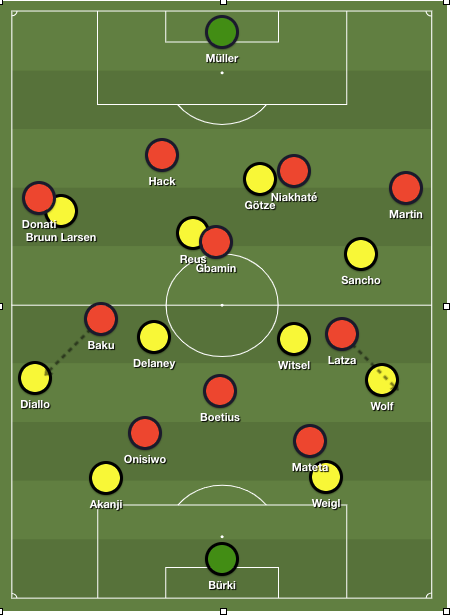
Using the rangy Gbamin as a single pivot, Mainz could send Boetius to press either Witsel or Delaney (depending on the side) alongside the two attackers, while Baku and Latza possessed enough closeout speed to get to the BVB fullbacks. Playing essentially 4v4 in the back required CBs Hack and Niakhaté to step up higher and break up the passes to Reus-Götze, which they did very well.
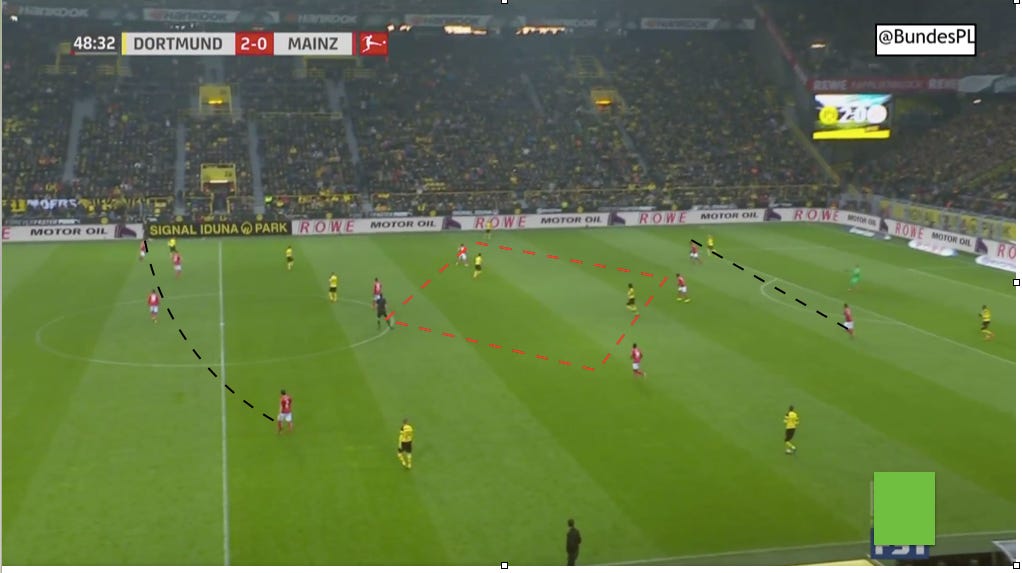
Dortmund to their credit dealt with the high press well and ran a couple of promising counters via Götze’s creativity (Bruun Larsen in the 50th failed to deliver a precise cross to Reus and Sancho in a 3v2) and could have increased the lead through Reus in the 51st. Boetius who has thrived in that no. 10 began to come alive with a dribble that resulted in a free kick causing difficulties for Bürki in the 53rd. Just a minute later, the 25-year-old Dutchman was guilty of overdribbling (did this in the 1h leading to a BVB counter) after a rebound and the chance was gone.
(asking) too much of JBL
Yet, as the game wore on, Dortmund began to look tired\succumb to the Mainz pressure, particularly on the wings.
https://www.youtube.com/watch?v=b_hsjBmh-Xg&vl=en
Bruun Larsen has had a rough go of it lately. The Dane had impressed in preseason and during the early September friendly against Osnabrück (currently assured of promotion to the 2.BL) with a four goal outburst would have started on MD1 if not for an injury. After playing over Sancho initially (it was him and Pulisic\Wolf early on in the season) the 20-year-old Dane was getting some plaudits scoring against FCB and Leverkusen and remained a starter until the Werder match in mid-December (save for a rare Guerreiro start against Hertha). Through a combination of a “lost season” from Pulisic and Maxi Philipp, Favre not playing Götze and not trusting the defensive work rate of Sancho early (Wolf at RW sigh) and not thinking of the Guerreiro at LW option (the Portuguese was also hurt a lot) the Dane has played almost 1200 minutes for BVB. In fact, behind Reus and Sancho -1485 and 1020 minutes respectively - JBL was the third most-used BVB attacking player. While he is a very direct player with some useful combination play on the counter (see the Dahoud chance last week vs Bayern), he remains a frustrating character because of his finishing difficulties: from his two league goals, the B04 one was a tap-in on an empty goal, while the other was a wonderful chip in the 7-0 route vs Nürnberg. Aside from those, he has been firing blanks, with two crucial misses against Hertha(red dot) and Augsburg (big blue dot near pen spot) in games where BVB dropped five points.
He is currently on an 0 for 19 shot scoreless streak since those goals, and many BVB fans feel that he’s not being put in a position to succeed by Favre. The Swiss manager likes JBL because of his athleticism, directness and defensive responsibility, though the latter was surely lacking against Mainz on Saturday. In Favre’s defense the only real alternatives were to play the disappointing Philipp out of position on the LW, and when Guerreiro\Pulisic have been healthy JBL has been a bench option. With Pulisic’s departure and Hazard’s arrival, the situation should improve.
Offensive reinforcements for Mainz (Quaison/Ujah) and the high press almost make the difference
Introducing Robin Quaison (missed training with a cold this week) for Mateta (who was on a yellow for a Mortal Kombat like uppercut on Wolf in the 42nd) in the 55th minute was a nice move by Schwarz. It kept up the pressure by FSV, who pressed high in a man-oriented scheme.
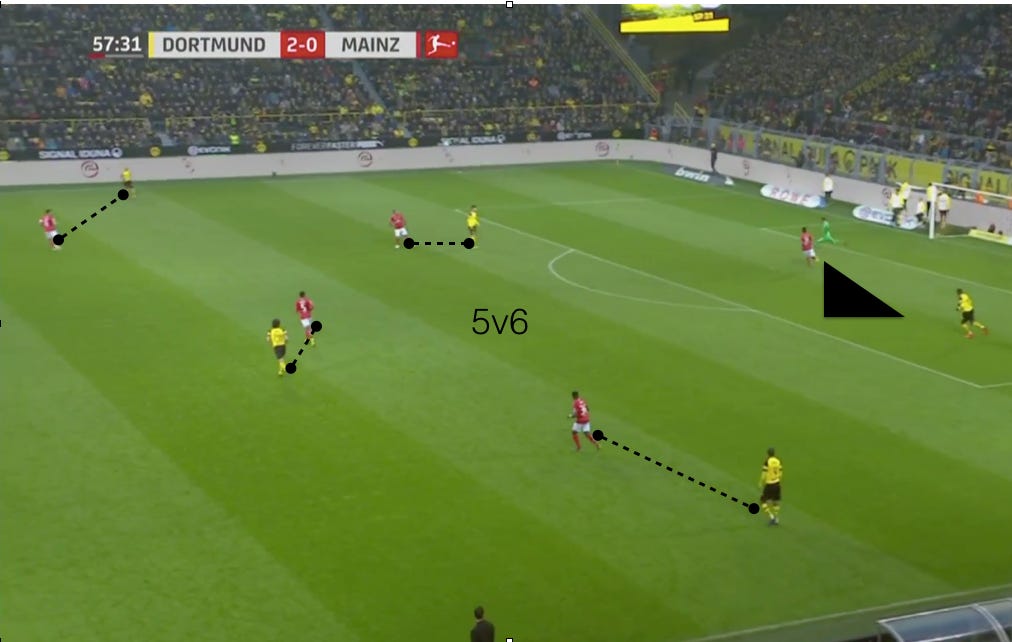
Playing with a high-narrow back four and winning duels was important and Mainz were set up well to deal with the long balls forced by the press: even if Sancho wins the aerial, Hack can clean it up while Gbamin can deal with Reus.
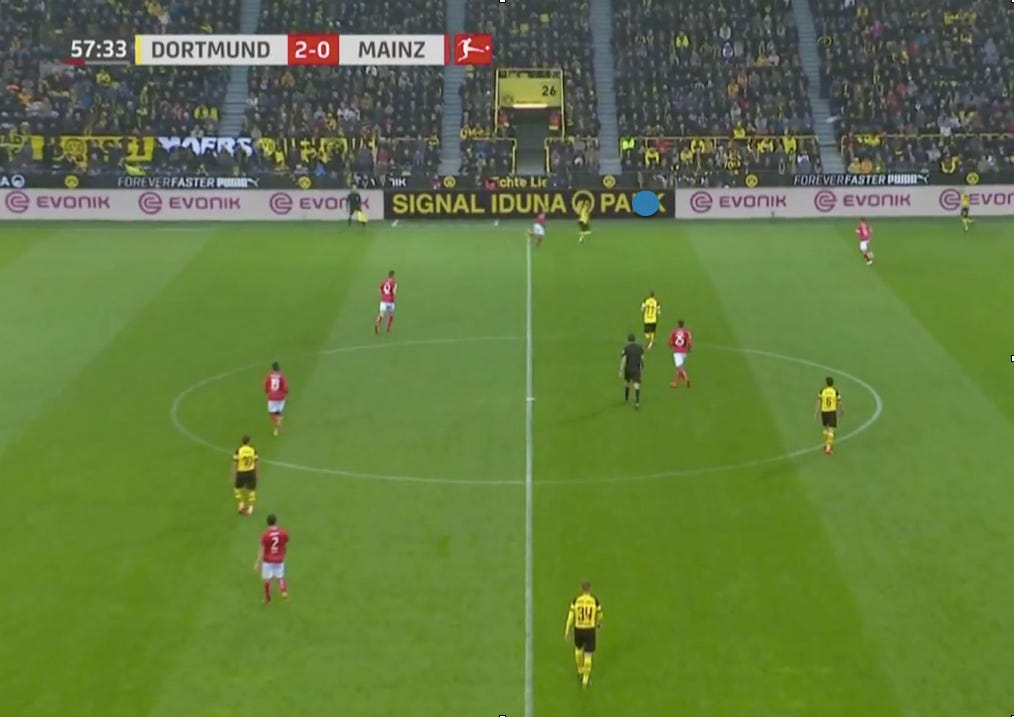
Using a front six press, Mainz were able to control 8 BVB players and still have a 4v3 advantage in the back:
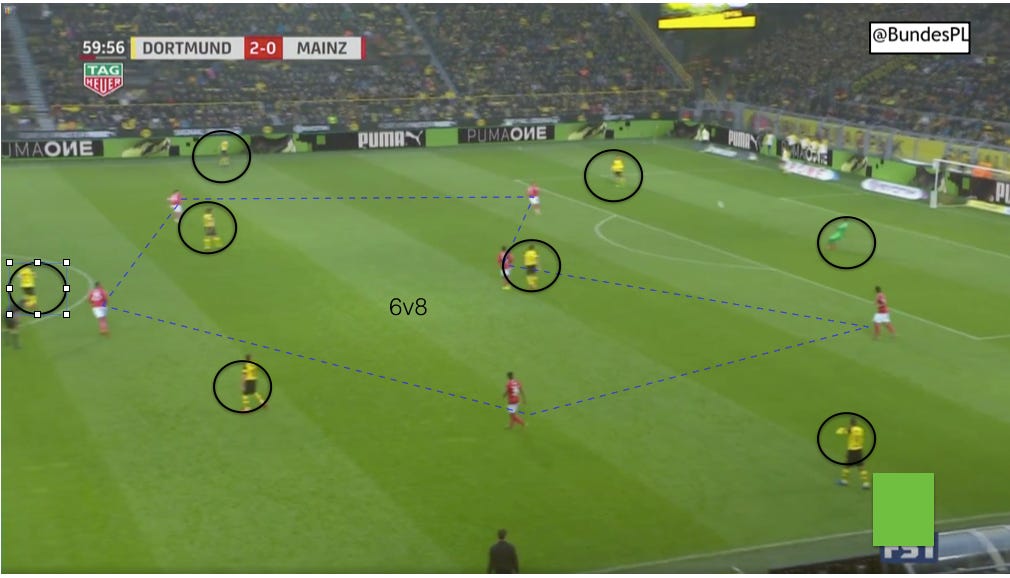
The other aspect of Schwarz’s game is of course to employ counterpressing (he’s a former Klopp teammate\disciple after all), thus winning the ball back high and create instant chances. Take a look at Mainz’s structure before the chance for Onisiwo that hit the post: it began with CB Alex Hack dribbling to BVB’s box before a clearance. All 10 Mainz players are 35yds from Dortmund’s goal!
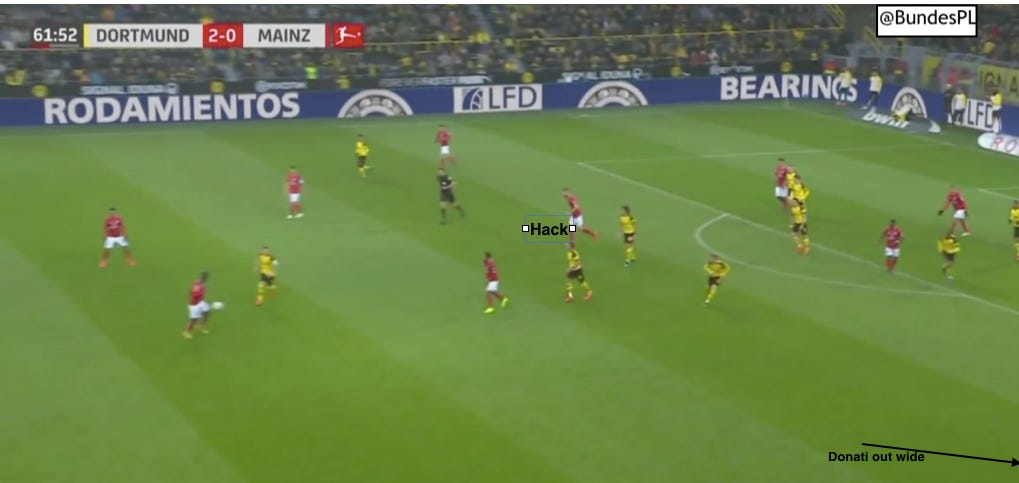
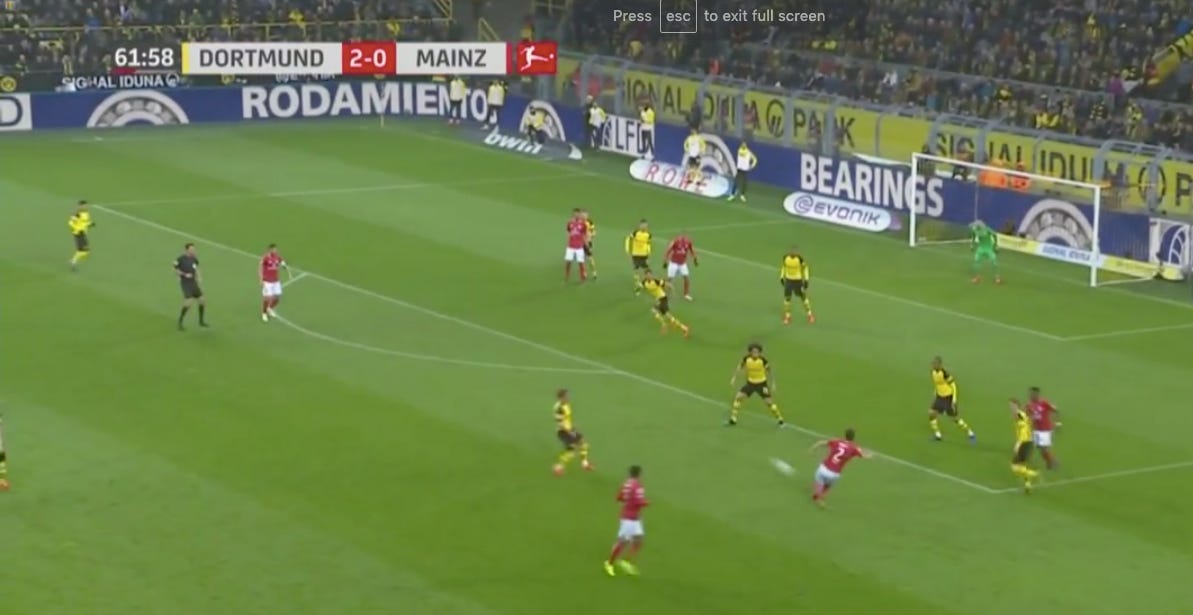
Donati dribbles and passes inward and then Latza touches it to Quaison who lays off for Onisiwo for the huge chance.
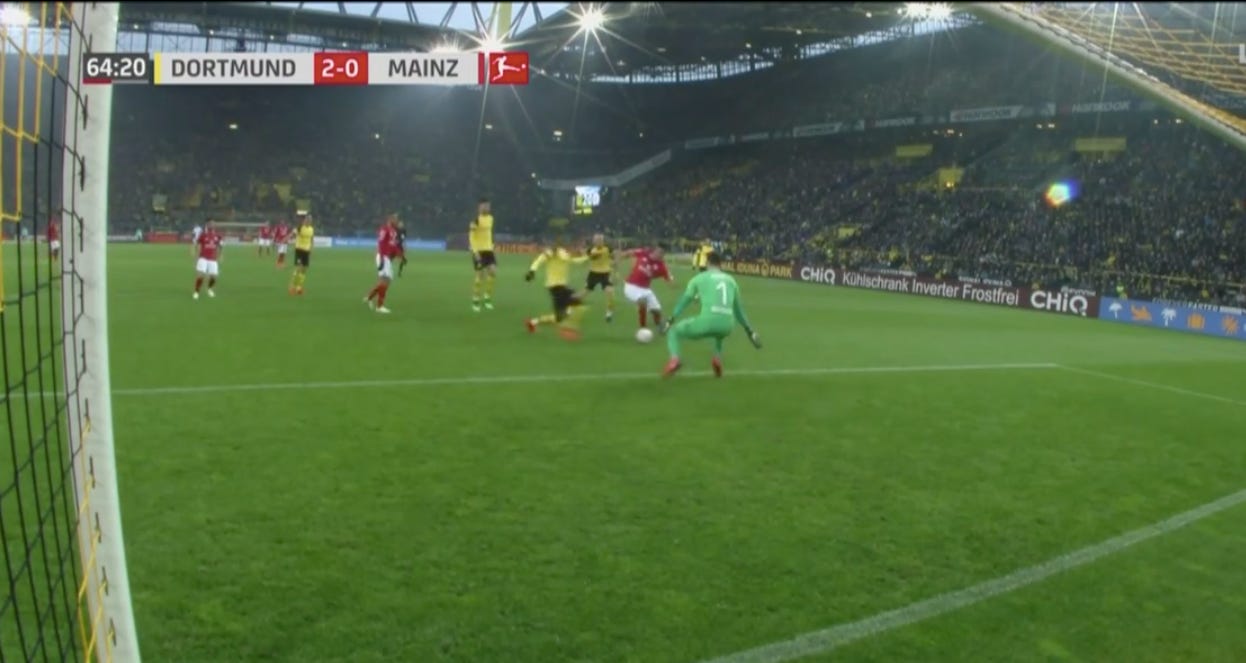
Mainz took 13 shots and created almost 2 XG after this, to BVB’s one, with a 61% possession to boot! At times it looked like they were the team battling for the Bundesliga title, going all out!
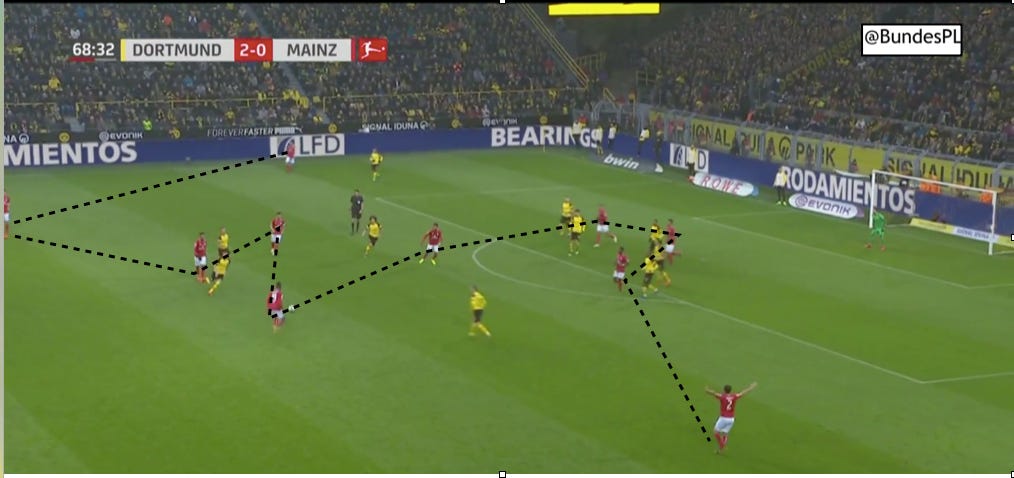
When BVB applied pressure, Mainz were able to escape via horizontal passes between their CBs and the long ball played behind by Hack and GK Müller, resulting in opportunities for Onisiwo and Quaison who used their physicality to create for themselves.
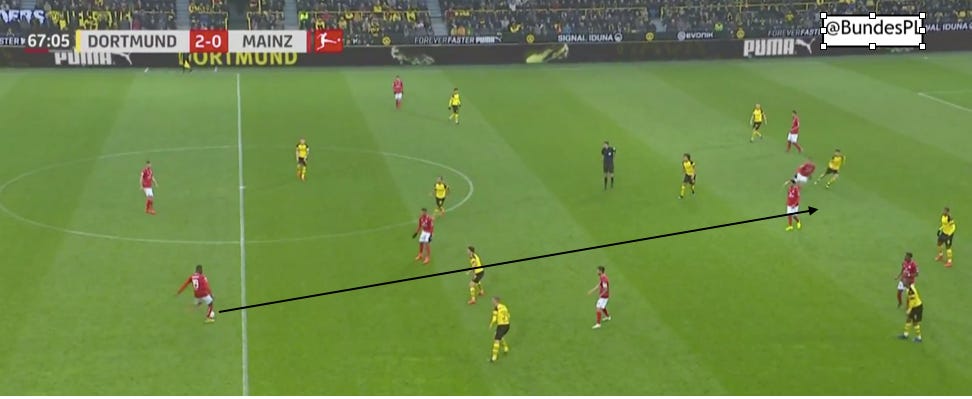
The game deteriorated into a chaotic frenzy: Dortmund ran counters via Sancho, but Bruun Larsen’s final decisions (a 70th minute pass sent Reus sprawling to the ground) yielded Mainz chances. After the 71st minute, FSV still had 10 attempts, while BVB needed FIFTEEN clearances (had 8 in the first 70 mins) - five from Dan-Axel Zagadou brought on for Marius Wolf, with Akanji pushing out to RB. And Dortmund needed every one of those clearances as FSV pumped in FOURTEEN crosses in the last 20 minutes. Interestingly, ten of them came from the right side via Donati and Onisiwo, but two of the most dangerous ones didn’t.
ROMAN BÜRKI
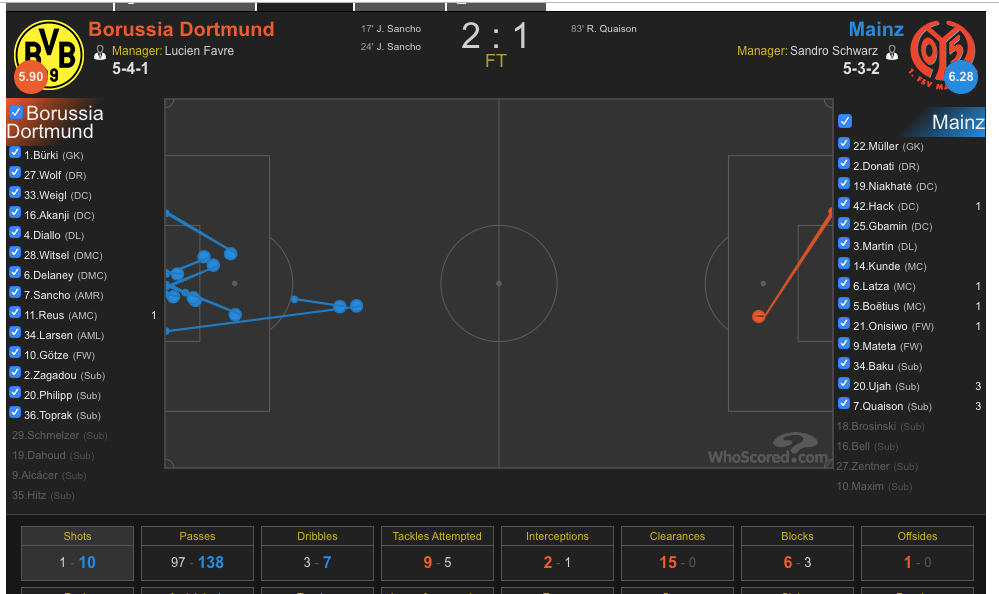
In the 83rd minute, Martín and Baku took a short corner and the Spanish LB whipped in a great cross on to the head of Gbamin. Bürki made a great save (foreshadowing), but Hack’s rebound deflected onto the path of Quaison for a 1 yard open goal tap-in. 2-1 and Mainz kept coming, and only Dortmund’s player of the season would stop them via a miraculous triple save:
Anthony Ujah had THREE tries from inside two yards but, as unused sub turned Dortmund’s Kendrick Perkins, Marcel Schmelzer’s wagged finger showed, it just wasn’t to be.
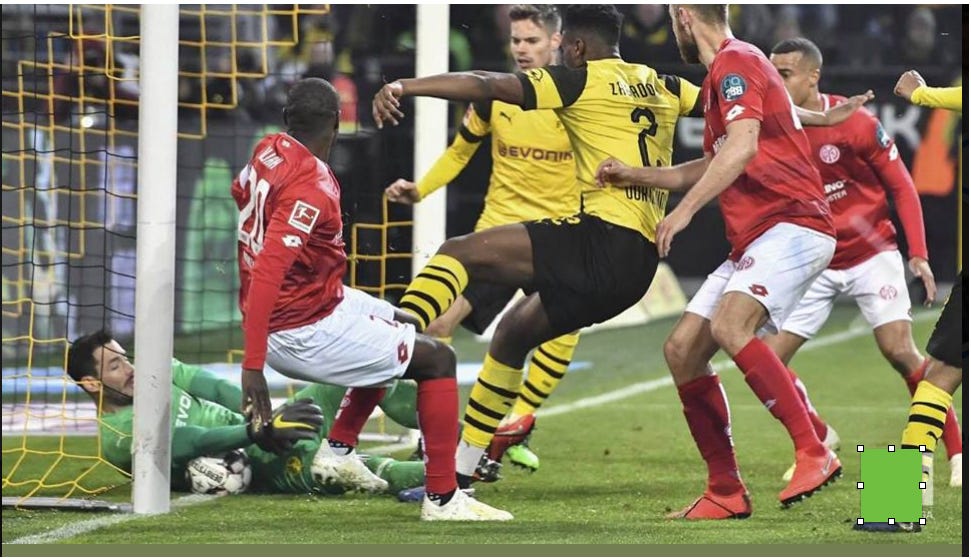
Takeaways
Mainz had nearly pulled off the comeback that Hoffenheim did (albeit from three down) and Sandro Schwarz should be (but knowing him won’t be) satisfied of a dominant second half performance that saw him outcoach Lucien Favre. They leave Dortmund wondering what would have happened if they started with the same aggressive 4-4-2 diamond against a vulnerable home team.
For Lucien Favre and Dortmund meanwhile, a brilliant first half, the three points and temporary first place were the positives to take from this game. However, the inability to deal with Mainz’s bread and butter formation and the second half collapse leaves many questions and doubts regarding the title race. One thing that should be beyond doubt however is that Roman Bürki is the player of the season for Dortmund. RIP Lars’ mega save counter!


